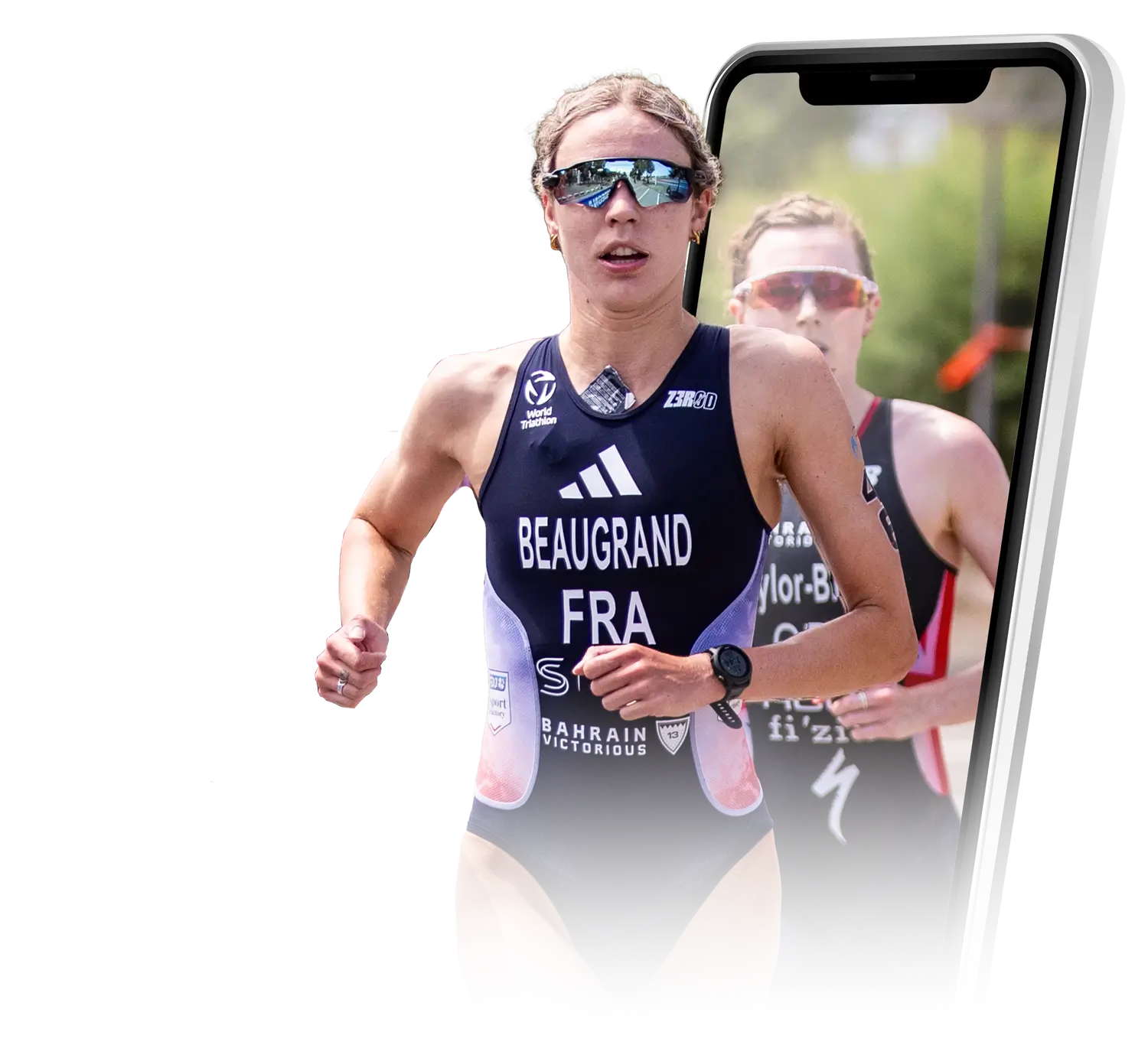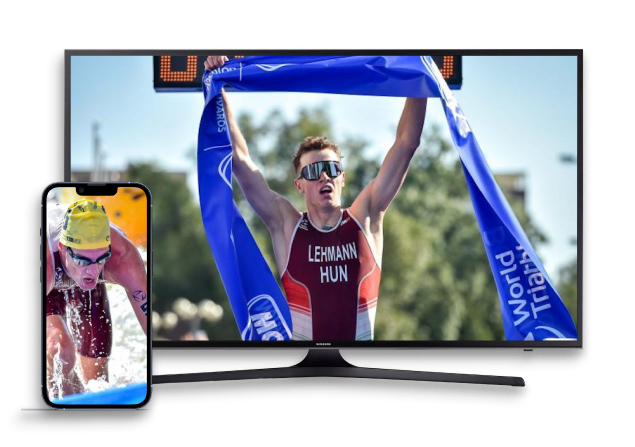One Athlete, three Sports!
Para triathlon is accessible, equitable, viable, sustainable and well balanced in every way, incorporating in its sub-disciplines three of the most prolific and recognisable medal sports in the history of the Paralympic Games.
Our commitments with Paratriathlon
To oversee the development of para triathlon
To oversee the development of para triathlon within the triathlon community by growing participation at all levels, building a pathway to, developing, elite performance, evolving events and building profile.
To upholding ethical principles
To upholding ethical principles and fair play at all times including moving towards evidence based assessment of Classification.
Foster the growth of Paratriathlon
To work with the IPC and to foster the growth of para triathlon as it becomes an integral and contributing part of the Paralympic movement.
- Streaming
- Television
 Watch our ParaTriathletes live and on-demand
Watch our ParaTriathletes live and on-demand
Stream every elite World Triathlon Series race and gain access to a huge video archive with the TriathlonLIVE all-access pass!
Subscribe now
Watch on Television
World Triathlon, in collaboration with InFront, offers live coverage of all World Triathlon Series races. Working alongside the world's largest public and sports broadcasters, the World Triathlon Series is the first of its kind to feature international live coverage of all events. With up to 20 camera positions at each race, including boat, motorcycle and helicopter cameras, triathlon fans can watch all the action from every corner of the world.
2023 TV Broadcaster List*
ORF
TV Arena Sport
ORF
TV Arena Sport
ORF
TV Arena Sport
ORF
TV Arena Sport
ORF
TV Arena Sport
ORF
TV Arena Sport
ORF
TV Arena Sport
*Broadcasters are subject to change.
 Stream Online
Stream Online
2023 WTCS Yokohama - Women
STARTS IN

Sport Classes
Para triathlon offers a unique and inclusive global opportunity for athletes with the recognised types of impairments to perform at elite levels in a modern, exciting and dynamic sport.
There are currently twelve sport classes for athletes with an impairment competing over the sprint Para Triathlon distance of 750m swim, 20km bike (hand bike/tandem), 5km run (racing wheelchair) at all World Triathlon-sanctioned para triathlon events.
Access to the Classification webinars:
Para triathlon Classification Webinar part 1
Para triathlon Classification Webinar part 2
Para triathlon Classification Webinar part 3
Both PTWC1 and PTWC2 classes compete in the same PTWC Medal Event
PTWC1
Most impaired wheelchair users. Athletes must use a recumbent handcycle on the bike course and a racing wheelchair on the run segment; Includes athletes with comparable activity limitation and an impairment of, but not limited to: muscle power, limb deficiency, hypertonia, ataxia or athetosis.
PTWC2
Least impaired wheelchair users. Athletes must use a recumbent handcycle on the bike course and a racing wheelchair on the run segment; Includes athletes with comparable activity limitation and an impairment of, but not limited to: muscle power, limb deficiency, hypertonia, ataxia or athetosis.
All the ambulant classes (PTS2-PTS5) compete in their own medal event.
PTS2
Severe impairments. In both bike and run segments, amputee athletes may use approved prosthesis or other supportive devices. Includes athletes with comparable activity limitation and an impairment of, but not limited to, limb deficiency, hypertonia, ataxia and or athetosis, impaired muscle power or range of movement.
PTS3
Significant impairments. In both bike and run segments, amputee athletes may use approved prosthesis or other supportive devices. Includes athletes with comparable activity limitation and an impairment of, but not limited to, limb deficiency, hypertonia, ataxia and or athetosis, impaired muscle power or range of movement.
PTS4
Moderate impairments. In both bike and run segments, amputee athletes may use approved prosthesis or other supportive devices. Includes athletes with comparable activity limitation and an impairment of, but not limited to, limb deficiency, hypertonia, ataxia and or athetosis, impaired muscle power or range of movement.
PTS5
Mild impairments. In both bike and run segments, amputee athletes may use approved prosthesis or other supportive devices. Includes athletes with comparable activity limitation and an impairment of, but not limited to, limb deficiency, hypertonia, ataxia and or athetosis, impaired muscle power or range of movement.
The three visually impaired classes (PTVI B1, B2 and B3) all compete in the PTVI medal event.
PTVI1
Includes athletes who are totally blind, from no light perception in either eye, to some light perception. One guide is mandatory throughout the race. Must ride a tandem during the bike segment. A guide from the same nationality and gender is mandatory throughout the race. Must ride a tandem during the bike segment.
PTVI2
Includes athletes who are more severe partially sighted athletes. One guide is mandatory throughout the race. Must ride a tandem during the bike segment. A guide from the same nationality and gender is mandatory throughout the race. Must ride a tandem during the bike segment.
PTVI3
Includes athletes who are less severe partially sighted athletes. One guide is mandatory throughout the race. Must ride a tandem during the bike segment. A guide from the same nationality and gender is mandatory throughout the race. Must ride a tandem during the bike segment.
Frequently Asked Questions
See all FAQsWorld Triathlon is the international governing body for the Olympic sport of triathlon and all related multisport disciplines around the world, including duathlon, aquathlon, cross triathlon and winter triathlon. It is the recognized International Federation for the sport of Triathlon (by the International Olympic Committee) and of Paratriathlon (by the International Paralympic Committee).
World Triathlon is the only entity/organization which can award a world title and racing in World Triathlon events is the only way to qualify for the Olympic and Paralympic Games.
Continental Confederations are approving and organizing the Continental Championships and Continental Cups.
World Triathlon has 172 Members National Federations from the 5 Continents.
Each NF is responsible for the qualification process of their athletes to Continental or International Events. Each NF is selecting the qualifying races (if applicable) for national athletes to register to the different World Championships.
For questions regarding qualification and registration to a World Triathlon event, or questions regarding the national uniform to wear. Find your NF
Each World Triathlon event is supervised by an Agreement between World Triathlon, the National Federation of the host country and a Local Organizing Committee (LOC).
World Triathlon grants a license to the LOC to host and organise a World Triathlon event.
The LOC can be a:
For Multisport and Triathlon World Championships, each AG athlete has to register through his/her National Federation.
Find your National Federation here: https://www.triathlon.org/agegroup/federations
At Multisport and Triathlon World Championships, AG race briefings are only for Team Managers. But a video race briefing will be available on the facebook page of the event and on the event website from the beginning of the race week. Also, Q&A sessions with Technical Officials will be organized at the venue during certain times for all athletes to ask their questions. We have some cases where an AG Athletes` Briefing is conducted (for example for Long Distance WCH).















